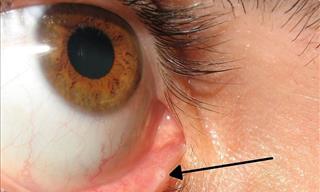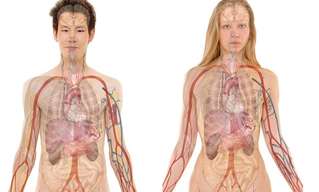
Did you know that our sense of smell can actually regulate how much weight we gain or lose? This has been confirmed by a recent study at the University of California, Berkeley, which was conducted on mice.
A group of mice were each given the same amount of food. Some of the mice could smell normally, others could not smell at all and others still had an enhanced sense of smell. The study found that the smell-deficient mice ate the same amount of fatty food as those that retained their sense of smell, however the latter ballooned to twice their normal weight.
The same pattern was found in mice with an enhanced sense of smell, but they put on even more weight than the mice with a normal sense of smell. The findings suggest that food smells play an important role in how the body processes calories.
It appears that there’s a link between the olfactory (smell) system and regions of the brain that regulate metabolism, such as the hypothalamus, however it remains unknown whether smell has an impact on neural circuits.
The study is one of the very first that shows that olfactory manipulation can have an effect on how the brain perceives energy balance, as well as how it regulates it.

Humans tend to lose their sense of smell due to aging, injury or diseases such as Parkinson’s, and often become anorexic as a result of doing so. This is due to the loss of pleasure in eating, which in turn can lead to depression and a further loss of appetite.
Published in the Cell Metabolism journal, the study implies that the loss of smell itself plays a role in dramatic weight fluctuations, and also suggests possible interventions for those who are experiencing a loss of their sense of smell, as well as those having trouble losing weight.
Researchers are theorizing that a lack of smell tricks the body into thinking it has already eaten. While searching for food, the body stores up calories, and then burns them off once a new supply of food has been secured.
In order to destroy the smell neurons in the mice’s noses, the researchers used gene therapy to disable it temporarily, however spare stem cells were retained so that the mice’s sense of smell could be returned to normal after a period of about three weeks.

The smell-deficient mice burned calories by turning their beige fat cells, which accumulate around thighs and midriffs in humans, into brown fat cells. This type of fat cell burns fatty acids to produce heat. Some turned almost all of their beige fat into brown fat to become lean, mean fat burning machines.
A downside found to the research was the large increases in noradrenaline levels seen in the mice. This is a stress hormone tied to the sympathetic nervous system, which could lead to a heart attack in humans when elevated levels of it are sustained over a period of time.
Although removing a human being’s sense of smell seems extreme, it might prove to be a viable alternative for those considering having stomach stapling or bariatric surgery to lose weight. The researchers have suggested wiping out an individual’s sense of smell for a period of six months, then allowing the olfactory neurons to regrow following the rewiring of their metabolic program.
People with eating disorders can have a hard time controlling the amount of food they eat, because they have a lot of craving. As a result, gaining control over the olfactory neurons is vital for modulating the neural pathway that regulates their cravings.
Content source: UC Berkeley
Images (including cover) by Deposit Photos.
 2:24
2:24
How Does Losing Weight Affect Our Bodies? Find Out Here!
Ever wondered what weight loss does to your body and brain? If so, you're about to find out!

These 7 Types of Hunger Can Cause You to Gain Weight
When a craving hits, determine where the source of your hunger is coming from with the help of this guide.

Lower Your Blood Pressure Naturally by Eating Watermelon
Watermelon is not only refreshing and delicious on a warm day - it has also been linked to lowering blood pressure levels.

Grill a Flawless Chicken Every time With These Tips
A full troubleshooting guide for your next grilled chicken. No more frustration, but a lot of preparation!
 5:05
5:05
The Meticulous Path of a Grain of Rice to Your Plate
How is rice harvested, processed, and packed? The entire operation is fascinating, to say the least. Here's how it's done.

Here Are the 16 Oldest Household Objects in the World
If you think ancient life is remote, these pre-historic household items will make you think again. Just look at how old they are!
 21:51
21:51
This Mind-Blowing Talk Explores the Nature of Reality
In this video, cognitive scientist, Donald Hoffman, attempts to answer this mind-blowing question in this incredible TED talk.

These Are the Miracles That Happen in Our Bodies Every Day
There is a lot that happens inside our bodies every single day. Did you know any of these facts?
 5:05
5:05
How Do the Drugs We Take Affect Our Brain?
We take many pills these days. What is it exactly that they DO to our brain? Find out now.

TRIVIA: 25 Shocking Differences Between the Sexes
Did you know that there are some vast differences between the sexes? These 25 scientific facts will probably come as a big surprise to you, they did to me.
 8:14
8:14
What Would You Do if You Had an Extra Thumb?
This revolutionary invention has the potential to revolutionize the field of prosthetics.

This Humanoid Robot May Join the Workforce Very Soon...
Meet Digit – a bipedal robot that's ready to join human workers at warehouses around the world as early as 2024.

Science Proves: These 10 Bible Stories Probably Did Happen
The Bible describes many seemingly supernatural cases, but today, science can show that they might have indeed happened.
 4:13
4:13
What Does Medicine ACTUALLY Do In the Body? Fascinating.
What really happens in our bodies when we take medicine, have you ever wondered? This video will answer your question.
 10:01
10:01
19 Things to AVOID to Make Your Phone Live Longer
19 common mistakes we all make, that make our phones age quicker.

New Study: There is a Sure Way to Slow Aging
This new study confirms what has long been suspected: The less calories we consume, the slower we age.

Researchers Claim This Ingredient Can Cure Depression!
A preliminary study has suggested that magic mushrooms may be able to soothe the symptoms of depression. Read here to find out more.

First US Embryo to be 'Edited'; Rise of Genetic Changes!
Could the first human embryos be genetically modified?
 12:38
12:38
Revolutionize Your Green Space: 12 Cool Garden Gadgets
Take your garden to the next level with the amazingly cool inventions and gadgets.

Incredible Science Breakthroughs That Made News in 2022
Let’s check out some of the most interesting scientific discoveries of 2022.
 10:01
10:01
9 UNBELIEVABLE Ice Science Tricks That'l Amaze You
Prepare to be amazed as ice takes center stage in these mind-boggling and unconventional science experiments.
 12:02
12:02
10 Incredible Animal-Inspired Robots
Let's meet some incredibly realistic robotic animals.

Incredible New Bionic Arm Fuses With Woman's Nerves
Karin's bionic hand is real sci fi, making her one of the first true cyborgs.

20 Amazingly Simple Inventions That Make Life Easier
Some wonderful inventions can fix some of the most annoying little problems that bug us every single day. Here are 20 of the most inventive ideas I've ever seen that I can't believe no one has invented before.

16 Surprising Things I Never Knew About Sleeping!
Who knew there was so much we don't know about our most popular activity! Here are 16 facts you may not have known about your sleep.

6 Shocking Truths About Coffee You Never Knew
Have you been believing these common coffee myths too?
 2:51
2:51
What is the Largest Organism on Earth?
You may think you know which animal is the largest on earth, but you may be mistaken...

These Archaeological Finds Left the World Mystified
Find out more about the most mysterious discoveries that archaeologists made.

Science Breakthrough: An Immunization Against Skin Cancer?
This scientific breakthrough offers hope for those who are struggling with skin cancer. You are now invited to discover more about this revolutionary vaccine.
 3:53
3:53
Are You a Late Sleeper? This Super Video Explains Why
Why is it that some people are late risers, and some are morning people? It's all down to our genetics. Have a look here to find out more.
 2:48
2:48
Revealed! This Is How Far We Have Sent Crafts into Space!
Ever wondered just how far humans have sent spacecrafts into space? If the answer is yes, then this video is just what you've been looking for.

INTERACTIVE: A Guide to the Workings of the Human Body
The human body is the most complex machine known to man, and the amount of things it has to do to keep us alive is incredible. View this interactive guide now.
 3:16
3:16
You Wouldn't Believe How Far Technology Has Come
Take a look at the advancements of technology in this video. Impressive.
 21:53
21:53
24 Confusing Optical Illusions Explained - Fascinating!
How do our eyes fool the brain? Let's find out as a neuroscientist explains the truth behind the most confusing optical illusions.

26 Incredible Facts About the Human Mind
The human brain is an interesting and powerful organ, which is why we've gathered 26 interesting facts about exactly how human psychology works.

9 Women Inventors Who Have Been Overlooked by History
History has overlooked many great women inventors. Here’s your chance to get to know a few of them.
 13:01
13:01
13 Incredible ROOF INNOVATIONS For Your House
Keep the roof of your house safe with these incredibly useful inventions.

7 Little-Known Body Parts We Never Knew About
Here's a look at some of the weird and little-known body parts that you didn’t know you had.

Can One Photo Really Tell How Good Your Eyesight Is?
Scientists say that this single photograph can tell you whether you have good vision or not. Who can you see in the image?
 23:26
23:26
Incredible: This Man Got the First Double-Arm Transplant
Felix Gretarsson got burned in both arms and needed the new ones. For that purpose, he went through history's FIRST 2-arm transplant.
 16:55
16:55
Sleep Inventions: 16 Gadgets to Help You Doze Off
If you frequently struggle with sleep, then trying these amazing new sleep innovations could help change your life.
 12:22
12:22
These Experiments Remind Us Water Isn't Just For Drinking
This video will make you stop and think for a second the next time you're having a glass of water as you remember the brightly colored experiments that this video shows us you can do with water

6 Weird and Creepy Medical Tools of the Past
After seeing these weird and creepy medical devices of the past, you’ll be thankful you live in the 21st century. Take a look for yourself.

The Facts You Didn't Know About the Human Body...
Discover 120 fascinating and surprising facts about your body you may not have known. Going over most of the body parts, you will learn so much you never knew about the body we all use.

GUIDE: How Alcohol Affects Us, Drink by Drink...
In this article, we're going to discuss the exact amounts of alcohol in our blood and what they look like, including how each level affects us and our ability to function.
 5:48
5:48
3 Surefire Ways to Always Identify Pseudoscience
Find out how you can identify pseudoscience, and learn how it differs from actual science.


